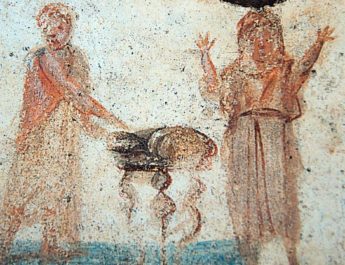1 Corinthians 1:1-9
Ordinary A8
1 Paul,A calledB to be an apostleC of ChristD JesusE by the will of God,F and our brotherG Sosthenes,H
A “Paul” = Paulos. From Latin Paulus (small, little). This is Paul or Paulus, meaning little.
B “called” = kletos. 11x in NT. From the same as klesis (calling, invitation); from kaleo (to call, summon, call out by name); related to keleuo (to command, order, direct); from kelomai (to urge on). This is called, invited, or a calling. Always used in the New Testament of a calling by God, being called to a purpose.
C “apostle” = apostolos. From apostello (to send, send away, send forth as a messenger, to commission); [from apo (from, away from) + stello (to set, arrange, prepare, provide for).] This is a messenger – someone sent out on a mission as an envoy or delegate. It can also refer to someone set at liberty. Generally, this is a messenger who is meant to be a representative of the one who sent them. They are thus, set apart on a mission literally or figuratively.
D “Christ” = christos. From chrio (consecrate by anointing with oil; often done for prophets, priests, or kings). Literally, the anointed one, Christ. The Greek word for Messiah.
E “Jesus” = iesous. From Hebrew Yehoshua (Joshua, the Lord is salvation); from YHVH (proper name of the God of Israel; the self-existent and eternal one); from havah (to become) or from hayah (to come to pass, become, be) + yasha (to deliver, defend, help, preserve, rescue; properly, to be open, wide or free, which implies being safe. So, in a causative sense, this is to free someone. This is Jesus or Joshua in Greek – the Lord saves or the Lord is salvation.
F “God” = theos. From Proto-Indo-European origins, meaning do, put, place. This is God or a god in general.
G “brother” = adelphos. From a (with; denotes fellowship) + delphus (womb). This is brother literal or figurative. Properly, this is one who shares a womb with you. Can also be used for a fellow Christian.
H “Sosthenes” = Sosthenes. 2x in NT. From the same as sozo (to save, heal, preserve, or rescue. Properly, this is taking someone from danger to safety. It can be delivering or protecting literally or figuratively.) [from sos (safe, rescued, well)] + sthenoo (to strengthen) [from sthenos (strength or physical vigor)]. This is Sosthenes – of safe strength.
2 To the church of God that is in Corinth,I to those who are sanctifiedJ in Christ Jesus, called to be saints,K together with all those who in every place call onL the nameM of our LordN Jesus Christ, both their Lord and ours:
3 GraceO to you and peaceP from God our Father and the Lord Jesus Christ.
I “Corinth” = Korinthos. 6x in NT. From Pre-Greek Pelasgian kar (point, peak); perhaps named after Corinthos, a descendant of the god Zeus. See https://en.wiktionary.org/wiki/%CE%9A%CF%8C%CF%81%CE%B9%CE%BD%CE%B8%CE%BF%CF%82#Ancient_Greek & https://en.wikipedia.org/wiki/Ancient_Corinth
J “sanctified” = hagiazo. From hagios (God is totally different from humanity and thus set apart. That which is consecrated to worship God (elements of worship) or to serve God (as the saints) are holy because they are now set apart for God’s purposes. Holy because important to God. This is sacred physically, pure. It can be morally blameless or ceremonially consecrated); from hagnos (holy, sacred, pure ethically, ritually, or ceremonially; prepared for worship, chaste, unadulterated, pure to the core; undefiled by sin; figurative for innocent, modest, perfect). This is to make or treat as holy, to set apart as holy, sanctify, hallow, or purify. It can be holy in a ceremonial sense as to dedicate. It can also mean to venerate.
K “saints” = hagios. Related to “sanctified” in v2. See note J above.
L “call on” = epikaleo. Related to “called” in v1 & 2. From epi (on, upon, at, what is fiting) + kaleo (see note B above). This is to call on, appeal to, or invoke. It could be to call to for help, worship, to give a testimony.
M “name” = onoma. May be from ginosko (know, recognize, learn from firsthand experience). This is a name, authority, cause, character, fame, reputation. The name was thought to include something of the essence of the person so it was not thought to be separate from the person.
N “Lord” = kurios. From kuros (authority, supremacy). This is a respectful address meaning master or sir. It refers to one who has control or power greater than one’s own. So, it was also applied to God and Jesus as Master or Lord.
O “grace” = charis. This is grace, kindness, favor, gratitude, thanks. It is the sense of being inclined to or favorable towards – leaning towards someone to share some good or benefit. This can be literal, figurative, or spiritual. It is grace as abstract concept, manner, or action.
P “peace” = eirene. Perhaps from eiro (to join, tie together to form a whole). This is one, peace, quietness, rest, peace of mind, harmony. Peace was a common farewell among Jews (i.e. shalom) and this well-wishing included a blessing of health and wholeness for the individual. This word also indicates wholeness and well-being – when everything that is essential is joined together properly. This is peace literally or figuratively. By implication, it is prosperity (but not in the sense of excessive wealth. Prosperity would have meant having enough from day to day.)
4 I give thanksQ to my God alwaysR for you because of the grace of God that has been given you in Christ Jesus, 5 for in every way you have been enrichedS in him, in speechT and knowledgeU of every kind— 6 just as the testimonyV of Christ has been strengthenedW among you— 7 so that you are not lacking in anyX spiritual giftY as you wait forZ the revealingAA of our Lord Jesus Christ.
Q “give thanks” = eucharisteo. Related to “grace” in v3. From eu (good, well, well done, rightly) + charis (see note O above). This is to be thankful, grateful, or to give thanks. It is to acknowledge God’s good grace with thanks or otherwise express gratitude. Can be used specifically for saying grace at a meal. This is the root word that “Eucharist” comes from, a name for the Lord’s Supper.
R “always” = pantote. Related to “all” in v2. From pas (all, every, the whole) + tote (then, at that time; can refer to past or future) [from hote (when); from ho (the)]. This is always, ever, at all times. Literally, this word means every when.
S “enriched” = ploutizo. 3x in NT. From ploutos (wealth, riches; abundance whether material or spiritual); from polus (much, many, abundant) OR from pleo (to sail, voyage); probably from pluno (to wash, plunge); from pluo (to flow) OR from pletho (to accomplish, supply, fill, or fulfill; this is to fill to maximum extent or fill up to individual capacity; this is fill in a literal or figurative sense). This is to make rich, cause to abound in, or enrich. Can be used literally or figuratively.
T “speech” = logos. From lego (to speak, tell, mention). This is word, statement, speech, analogy. It is a word that carries an idea or expresses a thought, a saying. It could refer to a person with a message or reasoning laid out in words. By implication, this could be a topic, line of reasoning, or a motive. It can be used for a divine utterance or as Word – Christ.
U “knowledge” = gnosis. From ginosko (know, recognize, learn from firsthand experience). This is knowing, knowledge, wisdom, understanding, or doctrine. Refers to knowledge from personal experience in connecting theoretical ideas to firsthand use. It can also be the act of knowing.
V “testimony” = marturion. 19x in NT. From martus (a witness whether having heard or seen something; witness literally, judicially, or figuratively; by analogy, a martyr). This is testimony, proof, or a witness. It refers to anything or anyone that could be entered as evidence.
W “strengthened” = bebaioo. 8x in NT. From bebaios (firm, secure, sure, certain, steadfast, enduring); from baino (to walk, go). This is properly, walking on solid ground. Thus, something that is firm, reliable, sure, unshakable. Figuratively, it is totally dependable and guaranteed support, security. It is good to place one’s trust in it because it’s solid footing.
X “any” = medeis. From mede (but not, and not, neither) [from me (never, neither, not lest) + de (but, and now, on the other hand)] + heis (one, only, some). This is no one, nothing, none. Literally, not even one.
Y “gift” = charisma. Related to “grace” in v3 & “give thanks” in v4. 17x in NT. From charizomai (to show favor, give freely, show kindness, forgive; properly, to show favor or grace); from charis (see note O above). This is the gift of grace, a spiritual gift, unmerited favor. It could be an ability given in the Spirit, something miraculous, or a religious qualification. Unsurprisingly, this is where the English “charisma” comes from.
Z “wait for” = apekdechomai. 8x in NT. From apo (from, away from) + ekdechomai (to take or receive, which implies waiting for or expecting; focusing on the outcome of waiting) [from ek (from, from out of) + dechomai (to receive, take, accept, welcome; implies personal interest)]. This is to await or except eagerly.
AA “revealing” = apokalupsis. 18x in NT. From apokalupto (to uncover, reveal, bring to light; revealing something that was hidden; figuratively, to make manifest) [from apo (from, away from) + kalupto (to cover, veil, hide, conceal; figuratively, to keep something a secret or to make sure it’s hidden) {related to kalube (hut, cabin)}]. This is a revealing, revelation, unveiling, appearing, coming, or manifestation.
8 He will also strengthen you to the end,BB so that you may be blamelessCC on the day of our Lord Jesus Christ. 9 God is faithful;DD by him you were called into the fellowshipEE of his Son, Jesus Christ our Lord.
BB “end” = telos. This is the final goal of a particular act – the point at which it is completed of consummated. It could imply accomplishing something in stages and completely finishing one of those stages. It can mean end, toll, aim, purpose, or tax. Can be used in a literal or figurative sense.
CC “blameless” = anegkletos. Related to “called” in v1 & “church” in v2 & “call on” in v2. 5x in NT. From a (not, without) + egkaleo (to accuse, bring charges, call to account, call in a debt, make a demand) [from en (in, on, at, by, with) + kaleo (see note B above)]. This is one who cannot be called to account – one who would not be convicted if legally scrutinized. So, this is someone who is irreproachable, blameless, or unaccused.
DD “faithful” = pistos. From peitho (to have confidence, urge, be persuaded, agree, assure, believe, have confidence, trust). This is faithful, reliable, trustworthy, believing, sure, and true. Properly, it is fullness of faith or loyalty to faith.
EE “fellowship” = koinonia. 19x in NT. From koinonos (sharer, partner, joint participant, associate); from koinos (properly, common, shared, ordinary, dirty, profane). This is fellowship, communion, sharing in, or contributory help. This is what is shared in common and thus is the foundation of fellowship. The kind of Greek that the New Testament is written in is called Koine Greek from this same root.
Image Credit: “The Philosopher or Saint Paul” by Vincenzo Gemito, 1917.




